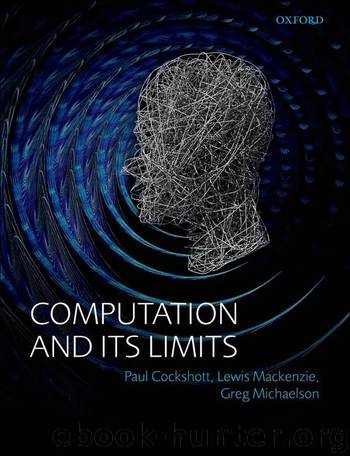Computation and its Limits by Cockshott Paul Michaelson Gregory Mackenzie Lewis M

Author:Cockshott, Paul, Michaelson, Gregory, Mackenzie, Lewis M [Cockshott, Paul, Michaelson, Gregory, Mackenzie, Lewis M]
Language: eng
Format: mobi, epub
Publisher: OUP Oxford
Published: 2012-01-02T21:00:00+00:00
6.2 The quantum rules
Quantum mechanics is a fundamentally epistemological theory. It is arguable that all of science is of this nature, but classical physics can be stated in strongly objective language (d’Espagnat, 2006); that is, its statements describe a world whose attributes are independent of the community of observers. Since all science begins with sentient investigation, some have contended that strong objectivity is an illusion but, whatever the case, in the quantum theory it is not present. All statements of the latter concern not what is, but what will be observed when someone looks. On what occurs between observations the theory is silent, providing only a calculus for determining the constantly evolving probabilities of the outcomes of the next observations.
Quantum theory is also inherently non-deterministic, although this claim requires some elaboration. When a measurement is made of a quantum system, we can typically enumerate the set of possible results (which may be infinite), but we cannot in general say in advance which value will be obtained. The theory does, however, allow us to compute probabilities for each such possible result and, while no prediction can be made in an individual case, when the measurement can be repeated on multiple identical systems, the relative frequency of the outcomes is observed to converge to these probabilities. When no observation is being made, however, the measurement probabilities themselves evolve deterministically with time according to the famous Schrödinger equation, given knowledge of the nature of the system and its environment, specifically via the system’s total energy. The energy of a system is in part due to its motion (kinetic energy) and in part due to the environmental forces acting on it (potential energy), and is usually formally summarized in a function of the system’s physical parameters (position, momentum, and so on) called the Hamiltonian, after the nineteenth-century Irish mathematician William Hamilton (1805–65). So although the outcomes of quantum measurements are random, the evolution of the probabilities associated with these measurements is deterministic.
To reiterate, then, quantum mechanics is concerned purely with predicting the outcomes of observations yet to be made. A quantum system is typically of atomic dimensions and assumed to be isolated from interaction with the environment, excepting that there may exist, in its Hamiltonian, a description of any fields in which the system may be located and that may endow it with potential energy. These are idealizations, of course, and they can be relaxed in order to extend the domain of the theory, but for the moment they will be accepted without further discussion. An observation involves making a measurement of one or more physical quantities associated with the system, and ideally we would like to have a quantum-theoretic description that would allow us to predict the outcome of any measurement. However, such a description can usually only be arrived at by knowing something of the history of the system; and since quantum mechanics is non-deterministic, it only allows us to predict probabilities of obtaining possible outcomes, not the actual outcomes that will in fact occur.
Download
Computation and its Limits by Cockshott Paul Michaelson Gregory Mackenzie Lewis M.epub
This site does not store any files on its server. We only index and link to content provided by other sites. Please contact the content providers to delete copyright contents if any and email us, we'll remove relevant links or contents immediately.
The Complete Stick Figure Physics Tutorials by Allen Sarah(7373)
Secrets of Antigravity Propulsion: Tesla, UFOs, and Classified Aerospace Technology by Ph.D. Paul A. Laviolette(5371)
Thing Explainer by Randall Munroe(3941)
The River of Consciousness by Oliver Sacks(3604)
The Order of Time by Carlo Rovelli(3194)
How To by Randall Munroe(3118)
A Brief History of Time by Stephen Hawking(3024)
I Live in the Future & Here's How It Works by Nick Bilton(2997)
What If?: Serious Scientific Answers to Absurd Hypothetical Questions by Randall Munroe(2705)
The Great Unknown by Marcus du Sautoy(2695)
Midnight in Chernobyl by Adam Higginbotham(2549)
Blockchain: Ultimate Step By Step Guide To Understanding Blockchain Technology, Bitcoin Creation, and the future of Money (Novice to Expert) by Keizer Söze(2496)
Networks: An Introduction by Newman Mark(2407)
The Meaning of it All by Richard Feynman(2355)
Easy Electronics by Charles Platt(2334)
The Tao of Physics by Fritjof Capra(2276)
Midnight in Chernobyl: The Untold Story of the World's Greatest Nuclear Disaster by Adam Higginbotham(2235)
Introducing Relativity by Bruce Bassett(2125)
When by Daniel H Pink(2118)
